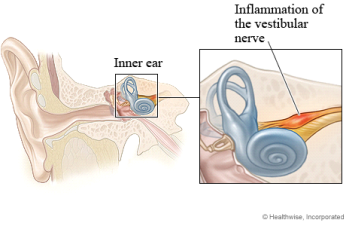Information about vestibular neuronitis
Vestibular neuronitis, also called Vestibular neuritis, is caused by an imbalance of nerve input between the left and right inner ears.
The balance organ is within the inner ear
Inside the inner ear is a series of canals filled with fluid, called the labyrinth. These canals are at different angles so when the head is moved, the rolling of the fluid inside these canals tells the brain exactly how far, how fast and in what direction the head is moving.
Information from these canals is passed along to the brain via the vestibular nerve, which lies next to the cochlear nerve. If the balance organs of one ear are inflamed, then the information sent to the brain conflicts with the information sent from the unaffected ear.
It is this conflict that causes the dizziness.
Labyrinthitis and vestibular neuritis are inner ear problems due to infection. Labyrinthitis and vestibular neuritis symptoms include dizziness.
In most cases, these conditions resolve without treatment within a few weeks. However complications of labyrinthitis may include balance problems and hearing loss.
Treatment options include medication and physiotherapy exercises to improve balance.
Vestibular neuronitis symptoms can include:
- Dizziness
- Intermittent
- A single attack of vertigo
- A series of attacks
- A persistent condition which diminishes over three to six weeks
The main symptom of vestibular neuronitis is vertigo, which appears suddenly, often with nausea and vomiting. Vertigo usually lasts for several days or weeks with rare cases taking months to go away entirely.
Vestibular neuronitis treatment options
Depending on the cause and severity, treatment options for labyrinthitis and vestibular neuritis can include:
- Anti-nausea medications
- Medications to dampen the sensations of dizziness
- Antibiotics, in the case of bacterial infection
- Antiviral drugs and corticosteroids, in the case of viral infection
- Balance exercises
- Hearing aid, if the hearing loss is permanent.
Treatment depends on the severity of the symptoms, however, commonly treatment for vestibular neuronitis consists of as short course of steroids.

